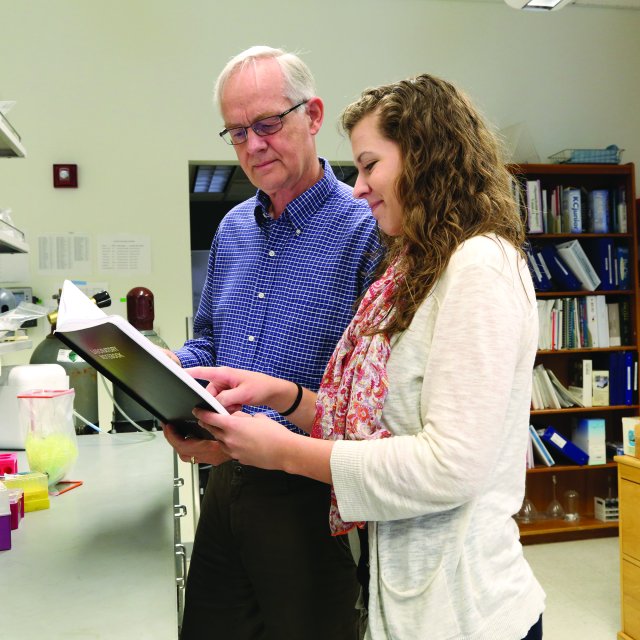
After graduating with a biology degree from Pasadena College, Dr. Doug Cavener (73) worked as a research assistant at Harvard University, earned his Ph.D. from the University of Georgia, and participated in postdoctoral research at Cornell University. He then held a faculty position for 18 years in the Department of Molecular Biology at Vanderbilt University before taking his current post as head of the Department of Biology at Penn State, where he has been for the last 14 years. But what’s more impressive than where he has been is the work he’s doing.
Cavener is a researcher in molecular cell biology and genetics, with a specific interest in the regulation, function, and evolution of genes. For the past 10 years, this interest has culminated in a focus on genes that are key in regulating processes for glucose homeostasis, as well as memory and learning. One of the genes Cavener is currently studying, known as “PERK,” affects these processes by regulating calcium signaling and protein trafficking.
“Calcium plays a key role in stimulating the release of insulin from the pancreas and neurotransmitters from neurons in the brain, and by studying how this gene regulates calcium, protein trafficking, and secretion, we hope to learn how to better treat diseases such as diabetes and Alzheimer’s,” explained Cavener. “In addition, these calcium-dependent processes in the brain underlie the very basic mechanisms of learning and memory, and our recent studies demonstrate that PERK also impacts working memory and behavioral flexibility.”
This research only scratches the surface of Cavener’s involvements. In the past year and a half, he has headed up a project to sequence the giraffe genome for the first time in order to understand not only how the giraffe got its long neck, but also how animals evolve different forms and functions. In addition, he is currently helping establish the science program at the Nelson Mandela African Institute of Science and Technology, a new university in Tanzania created in response to Nelson Mandela’s dream of developing an MITcaliber institution in Africa. A firm believer in this project, Cavener currently serves as an adjunct professor there and has helped the university apply for research and faculty-student development grants.
With such a remarkable list of science-related credentials, it’s hard to believe that Cavener entered Pasadena College as a history major. It wasn’t until taking an introduction to biology course with Glenn Keys his sophomore year that an interest in the sciences began to form. Curious to learn more, he enrolled in Dr. Vic Heasley’s organic chemistry class.
“Dr. Heasley taught me that science isn’t something you learn; it’s something you do. Through him, I saw that science is about discovering and seeking the truth, and that’s why I decided I wanted to be a scientist,” he said.
That decision not only changed the course of his career, but has also greatly impacted the science community. Since becoming the head of Penn State’s biology department in 2000, he has doubled the department’s faculty to more than 50 members. In addition to increasing the size, he has also increased the caliber of the department, which is now ranked No. 6 among all biological science departments in the nation based on faculty research accomplishments.
Perhaps most cherished among his achievements are the relationships he has built with the Ph.D. students he has trained over the course of his career. It is in these relationships Cavener feels things have truly come full circle, as he uses the encouraging moments he had with his own professors at Pasadena College to now inspire the next generation.
“For the past 32 years I have been continually training cohorts of four or five Ph.D. students, and I meet with them individually almost every day,” said Cavener. “My goal is not to just teach them skills, but also how to think critically and how to make sound judgments. I try to open their minds to discovery while also dealing with ever-present failures and setbacks. Science is the ultimate high-stakes detective mystery, a book still being written, one you can’t put down at night.”

The Viewpoint
PLNU's university publication, the Viewpoint, seeks to contribute relevant and vital stories that grapple with life's profound questions from a uniquely Christian perspective. Through features, profiles, and news updates, the Viewpoint highlights stories of university alumni, staff, faculty, and students who are pursuing who they are called to be.